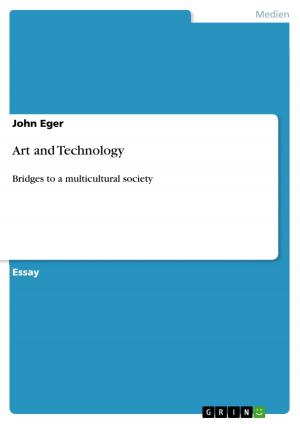The future of the EU-Foreign Policy in the light of the constitutional treaty
Nonfiction, Social & Cultural Studies, Political Science| Author: | Timo Rahmann | ISBN: | 9783638456234 |
| Publisher: | GRIN Publishing | Publication: | January 17, 2006 |
| Imprint: | GRIN Publishing | Language: | English |
| Author: | Timo Rahmann |
| ISBN: | 9783638456234 |
| Publisher: | GRIN Publishing |
| Publication: | January 17, 2006 |
| Imprint: | GRIN Publishing |
| Language: | English |
Seminar paper from the year 2005 in the subject Politics - International Politics - Topic: European Union, grade: A-, Sabanc? University, course: The European Union: Politics, Policies and Governance, 18 entries in the bibliography, language: English, abstract: A common European policy in fields of Foreign and Security Affairs has always been one of the crucial points of ongoing European Integration. It seems suitable that one can find here a point where the controversial debate about a supranational or a more intergovernmental character of the Union manifests itself. Since the external relations of a nation-state are still considered as the core of national qualities the activities and authorities of the EU in this area are consequently much more disputed than, for instance, issues only regarding the Common Market. From the early days of European integration on, the EU has been trying to enhance its ability to perform as a unified and effective actor on the global stage. However, to some extent many of the purposes remained ambitious rhetoric. Great expectations with little or no chance of actually coming to fruition, this could, if you put it in a nutshell, apparently be an easy and appropriate description of the dilemma the EU foreign and security policy suffers. Many observers expected a fundamental shift with the work of the constitutional convention. The arising euphoria about the Treaty establishing a Constitution for Europe (hereafter: TCE) had soon worn off since the constitutional breakthrough has not happened. This paper concentrates on the impact of the TCE on the future of the Common Foreign and Security Policy (CFSP) and in particular on Foreign Policy rather than the security aspects. It focuses on the question whether there is great probability that the TCE will improve Europe's capability to act according to the demands the Union made on several occasions on itself. In order to discuss this, the paper will recapitulate the main developments and outlines of the CSFP up to now in a first step from a rather historical perspective . T he spotlight will turn to the current discussion about the constitution and its consequences in chapter three. This section will include a rather technical look on the constitutional arrangements but also an analysis of potentials and shortcomings lying in the TCE. Chapter VI will deal with attempts at explanations and will therefore briefly discuss major theories of European Integration and their explanatory capacity. A last part is reserved for some concluding remarks and brief outlook.
Seminar paper from the year 2005 in the subject Politics - International Politics - Topic: European Union, grade: A-, Sabanc? University, course: The European Union: Politics, Policies and Governance, 18 entries in the bibliography, language: English, abstract: A common European policy in fields of Foreign and Security Affairs has always been one of the crucial points of ongoing European Integration. It seems suitable that one can find here a point where the controversial debate about a supranational or a more intergovernmental character of the Union manifests itself. Since the external relations of a nation-state are still considered as the core of national qualities the activities and authorities of the EU in this area are consequently much more disputed than, for instance, issues only regarding the Common Market. From the early days of European integration on, the EU has been trying to enhance its ability to perform as a unified and effective actor on the global stage. However, to some extent many of the purposes remained ambitious rhetoric. Great expectations with little or no chance of actually coming to fruition, this could, if you put it in a nutshell, apparently be an easy and appropriate description of the dilemma the EU foreign and security policy suffers. Many observers expected a fundamental shift with the work of the constitutional convention. The arising euphoria about the Treaty establishing a Constitution for Europe (hereafter: TCE) had soon worn off since the constitutional breakthrough has not happened. This paper concentrates on the impact of the TCE on the future of the Common Foreign and Security Policy (CFSP) and in particular on Foreign Policy rather than the security aspects. It focuses on the question whether there is great probability that the TCE will improve Europe's capability to act according to the demands the Union made on several occasions on itself. In order to discuss this, the paper will recapitulate the main developments and outlines of the CSFP up to now in a first step from a rather historical perspective . T he spotlight will turn to the current discussion about the constitution and its consequences in chapter three. This section will include a rather technical look on the constitutional arrangements but also an analysis of potentials and shortcomings lying in the TCE. Chapter VI will deal with attempts at explanations and will therefore briefly discuss major theories of European Integration and their explanatory capacity. A last part is reserved for some concluding remarks and brief outlook.















